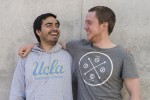Editor’s note: This story is Part 3 of a series in which Bruin contributors Sydney Walls and Laurel Scott follow two students through the Dashew Center’s Language Exchange program. Click here to listen to Part 1 and Part 2.
Bruin: Maurice Maurer, a first-year graduate student in physics, and Luis Quintero Rodriquez, a third-year chemical engineering student, are finishing up the quarter they have spent in the Dashew Language Exchange Program.
Over the past eight weeks, the pair has had the chance to learn each other’s native language. During their time together, they’ve grown close and a friendship has formed. Even though the majority of the time was spent getting to know each other they did learn some basic phrases in each other’s native languages.
Quintero: Speaks German
Maurer: Speaks Spanish
Bruin: Despite the success that this pair has found in the Dashew Language Exchange Program, many domestic students have never been to the Dashew Center, or even heard of it. The Dashew Center is here for all students, but overall it is used more by international students. Maurer has found friends through Dashew, but very few are American.
Maurer: I would prefer if there were more Americans, because it’s mostly international students. And if they mixed more Americans in there so we could actually talk to people that are from here to make American friends instead of just international friends.
Bruin: Shideh Hanassab is the director of Dashew Center, and was herself an international student here at UCLA and did all her schooling in America. Hanassab says that many students are involved in Dashew’s programs, but few are domestic.
Hanassab: In terms of domestic students we would like to have more because international students also want to connect to domestic students. I think it is a mutual benefit. You can learn about a different culture interacting with our international students.
Bruin: During her time as director of the Dashew Center, Hanassab has seen many international students come and go. She has seen them struggle with confidence in their English and adjusting to American culture.
Hanassab: Sometimes they are not confident with their English, even though most of the time they have perfect English. Better than mine. I was an international student myself so I can relate.
Bruin: According to Hanassab, international students help to make our campus more vibrant by sharing their culture with others. Domestic students get to see the world through different perspectives, and without international students, the diversity of our campus wouldn’t be as vast.
Hanassab: We have students from 120 countries. Interacting with international students is like traveling throughout the world. International students bring a different perspective, different point of view, they make our campus much more richer.
Bruin: Getting to know someone from a different part of the world can be a rewarding experience. You can see firsthand how cultures differ and you can integrate yourself into each other’s cultures. Maurer and Quintero have found their new friendship to be as rewarding as learning a new language. Even though they have been practicing their languages, English is still the easier route to take.
Quintero: It was his birthday last week and I went to his house with his German friends and we couldn’t speak German and Spanish, but it was good.
Bruin: Despite coming from opposite ends of the world, both can agree that when learning a language, the vocabulary can be the hardest part. German is Quintero’s fourth language, and if anyone knows how difficult learning languages is, it would be him.
Quintero: At the beginning when I was learning French and I didn’t know the vocabulary, I wanted to express things like I saw the table, but I couldn’t remember the vocabulary. Then I would get stuck and stop speaking. The vocabulary is the most important.
Bruin: Thanks to the Language Exchange Program, Quintero and Maurer have been able to learn a new language – and make a new friend from halfway across the world. They might not be from the same country or even continent, but some interests, like soccer, are universal.
Maurer: He’s a really good player.
Bruin: They plan to keep seeing each other after the program is over, and Quintero sheepishly admits that in the future they may need to spend more time practicing vocabulary and less time talking sports.
Maurer: We didn’t do that much of the language learning, the better part was becoming friends.
Bruin: For Daily Bruin Radio, I’m Sydney Walls. And I’m Laurel Scott.
